|
|
|
Sort Order |
|
|
|
Items / Page
|
|
|
|
|
|
|
| Srl | Item |
| 1 |
ID:
106670
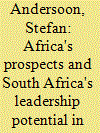

|
|
|
|
|
| Publication |
2011.
|
| Summary/Abstract |
This article examines Africa's role in an evolving international system where powerful emerging markets, such as bric, together with established powers are shaping economic trajectories. The specific focus is on South Africa as an aspiring leader on the African continent, and on its potential for becoming an emerging market shaping the global order together with bric and the West. It is unclear whether a changing global economy in which the postcolonial world plays a greater role will result in improved developmental prospects for Africans as African countries gradually reorient themselves from the West to the South, or whether relations with emerging markets will resemble neo-colonial ties with the West. South Africa's structural weakness, stemming from serious domestic problems of a social, political and economic nature, threatens to undermine its standing in Africa and its emerging market status.
|
|
|
|
|
|
|
|
|
|
|
|
|
|
|
|
| 2 |
ID:
058756
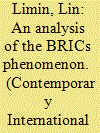

|
|
|
| 3 |
ID:
088609
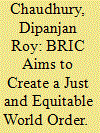

|
|
|
|
|
| Publication |
2009.
|
| Summary/Abstract |
EVER SINCE THE END OF COLD WAR, it was strongly felt that a multi-lateral world order must be established. With countries like Russia, India, China and Brazil, emerging as powerful economies over the last two decades, there was an urge for them to join hands to complement each other and create a multi-polar world. It was felt that such an arrangement was necessary to voice the opinion of world's four biggest countries and subsequently the Brazil, Russia, India and China (BRIC) was conceptualized. Such an alliance is not just an economic one, but an initiative to create a just world order. BRIC is an example of how countries with different cultures are able to unite to work on common initiatives, pursuing peace, multilateralism and respect for international law. The convergence that they have been able to foster, notwithstanding the plurality among our points of view, is likely to strengthen the actions we take in different multilateral forums and levels.
BRIC, an acronym coined by Goldman Sachs to define a group of large emerging economies with fast growth rates, aspires to play a significant role in reshaping the global economic and political order. On May 16 this year Brazil, Russia, India and China vowed to turn their four-way group into a powerful instrument for changing the world. At their first stand-alone meeting at Yekaterinburg, Russia, the Foreign Ministers of the four countries institutionalized BRIC, and agreed to hold regular meetings at the level of Foreign Ministers. Though the BRIC concept was articulated by the corporate sector, the four countries found it practical to adopt it as part of foreign diplomacy, especially in view of their reservations towards some of the policies being defended by the US at world bodies.
|
|
|
|
|
|
|
|
|
|
|
|
|
|
|
|
| 4 |
ID:
106394
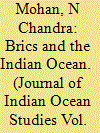

|
|
|
| 5 |
ID:
103028
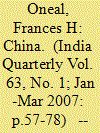

|
|
|
| 6 |
ID:
151262
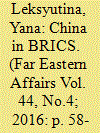

|
|
|
|
|
| Summary/Abstract |
The author cites arguments in support of the thesis that China, while standing out among the BRICS countries in its economic achievements and a high degree of involvement in world economic ties, is the main beneficiary of the BRICS efforts aimed at changing the present monetary and financial system.
|
|
|
|
|
|
|
|
|
|
|
|
|
|
|
|
| 7 |
ID:
101505
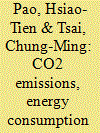

|
|
|
|
|
| Publication |
2010.
|
| Summary/Abstract |
This paper examines dynamic causal relationships between pollutant emissions, energy consumption and output for a panel of BRIC countries over the period 1971-2005, except for Russia (1990-2005). In long-run equilibrium energy consumption has a positive and statistically significant impact on emissions, while real output exhibits the inverted U-shape pattern associated with the Environmental Kuznets Curve (EKC) hypothesis with the threshold income of 5.393 (in logarithms). In the short term, changes in emissions are driven mostly by the error correction term and short term energy consumption shocks, as opposed to short term output shocks for each country. Short-term deviations from the long term equilibrium take from 0.770 years (Russia) to 5.848 years (Brazil) to correct. The panel causality results indicate there are energy consumption-emissions bidirectional strong causality and energy consumption-output bidirectional long-run causality, along with unidirectional both strong and short-run causalities from emissions and energy consumption, respectively, to output. Overall, in order to reduce emissions and not to adversely affect economic growth, increasing both energy supply investment and energy efficiency, and stepping up energy conservation policies to reduce unnecessary wastage of energy can be initiated for energy-dependent BRIC countries.
|
|
|
|
|
|
|
|
|
|
|
|
|
|
|
|
| 8 |
ID:
090942
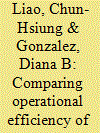

|
|
|
|
|
| Publication |
2009.
|
| Summary/Abstract |
Using partial factor productivity and data envelopment analysis approaches, this study measures and compares the operational efficiency of the 10 dominant mobile operators in Brazil, Russia, India and China (BRIC) between 2002 and 2006. The results of data envelopment analysis indicate that the two leading Brazilian mobile operators, Vivo and TIM, are fully efficient throughout the entire period of study; however, Indian mobile operators are the least efficient among BRIC operators. Interestingly, the findings of this study verify that full operational efficiency can be achieved by operators with large revenues, such as China Unicom, and by others with medium and small revenues, such as Vivo, TIM and Oi. Partial factor productivity demonstrates that 3 of the 4 Brazilian mobile operators, Vivo, TIM and Oi, have remarkable productivity ratios, and that the state-owned operator, China Unicom, has the highest revenue per capital expenditure among BRIC operators. In contrast, Indian mobile operators' productivity ratios are generally low compared to other BRIC mobile carriers.
|
|
|
|
|
|
|
|
|
|
|
|
|
|
|
|
| 9 |
ID:
126271
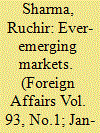

|
|
|
|
|
| Publication |
2014.
|
| Summary/Abstract |
In the middle of the last decade, the average growth rate in emerging markets hit over seven percent a year for the first time ever, and forecasters raced to hype the implications. China would soon surpass the United States as an economic power, they said, and India, with its vast population, or Vietnam, with its own spin on authoritarian capitalism, would be the next China. Searching for the political fallout, pundits predicted that Beijing would soon lead the new and rising bloc of the BRICs -- Brazil, Russia, India, and China -- to ultimate supremacy over the fading powers of the West. Suddenly, the race to coin the next hot acronym was on, and CIVETS (Colombia, Indonesia, Vietnam, Egypt, Turkey, and South Africa) emerged from the MIST (Mexico, Indonesia, South Korea, and Turkey).
|
|
|
|
|
|
|
|
|
|
|
|
|
|
|
|
| 10 |
ID:
125440
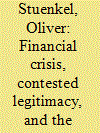

|
|
|
|
|
| Publication |
2013.
|
| Summary/Abstract |
The rise of the BRIC grouping (Brazil, Russia, India, China) is one of the most commented on phenomena in international politics of the past year. Yet little is known about how and why institutionalized cooperation between the BRIC countries began. This article makes two arguments. First, an unprecedented combination in 2008- a profound financial crisis among developed countries, paired with relative economic stability among emerging powers- caused a legitimacy crisis of the international financial order, which led to equally unprecedented cooperation between emerging powers in the context of the BRIC grouping. The BRIC countries were able to use their temporarily increased bargaining power to become agenda setters at the time -culminating in the international Monetary Fund quota reform agreed on in 2010. This shows that even short periods of reduced legitimacy in global governance can quickly lead to the rice of alternative institution - such as, in the case of the crisis that began in 2008, the BRIC platform- which now forms part of the landscape of global governance . Second, intra-BRIC cooperation in the area of international finance enhanced trust among the BRIC countries and led to a broader type of cooperation in many other areas, suggesting the occurrence of spillover effects. Intra-BRICS cooperation (Brazil, Russia, India, China, South Africa) is therefore likely to continue, even after the condition that facilitated its genesis- the crisis in the West- have disappeared.
|
|
|
|
|
|
|
|
|
|
|
|
|
|
|
|
| 11 |
ID:
100400
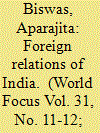

|
|
|
| 12 |
ID:
107434
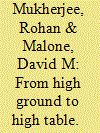

|
|
|
|
|
| Publication |
2011.
|
| Summary/Abstract |
Independent India's multilateral strategy was designed defensively as a means to provide the country with some leeway in an intensely competitive bipolar world. Today, India casts itself as an emerging power intent on exerting the bilateral and multilateral influence that the country's founding leaders had long aspired to. Obsolete frameworks such as nonalignment and developing world leadership have mostly been jettisoned in the process. However, questions remain about India's willingness and capacity to take on global responsibilities to match its global aspirations. This article traces the evolution of India's multilateral approach and examinest is multilateral stance through several prisms: the UN Security Council, the World Trade Organization, global climate change negotiations, and some emerging international groupings of states in which India plays a role. Among our conclusions is that, in India's diplomacy, much depends on domestic factors.
|
|
|
|
|
|
|
|
|
|
|
|
|
|
|
|
| 13 |
ID:
137834
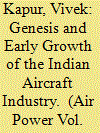

|
|
|
| 14 |
ID:
110148
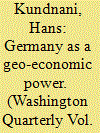

|
|
|
| 15 |
ID:
126254
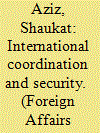

|
|
|
| 16 |
ID:
103693
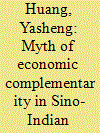

|
|
|
| 17 |
ID:
101903
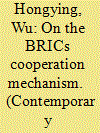

|
|
|
| 18 |
ID:
178456
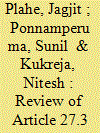

|
|
|
|
|
| Summary/Abstract |
Under Article 27.3(b) of the Trade-Related Aspects of Intellectual Property Rights (TRIPS) Agreement of the World Trade Organization (WTO), all members are required to extend private property rights to life forms. Using official WTO documents, this article analyzes the negotiating positions of WTO members on life patents during a review of Article 27.3(b) which commenced in 1999 and is currently ongoing. Initially, developing countries raised serious ethical concerns regarding life patents, creating a clear North-South divide. However, over time the position of Brazil and India moved away from the ethics of life patents to the prevention of bio-piracy, a position supported by China. Russia too is supportive of life patents. A group of small developing countries have, however, continued to question the morality of life patents despite this “BRIC wall,” changing the dynamics of the negotiations from a North-South divide to one which now includes a South-South divide.
|
|
|
|
|
|
|
|
|
|
|
|
|
|
|
|
| 19 |
ID:
139723
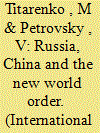

|
|
|
|
|
| Summary/Abstract |
IN RECENT YEARS, the global situation has experienced powerful shocks that have aggravated existing contradictions, fanned tensions and given rise to various threats. On the one hand, processes of mutual integration of countries remain in place and are, moreover, being speeded up by globalization, and there is a search for an optimum model of international relations based on principles of polycentrism. On the other, effects of the global financial and economic crisis are not subsiding, and in various regions - in Europe (Ukraine), in the Middle East, in Northeast Asia - there exist serious challenges to regional and global security. Time and again, unresolved old-time territorial disputes or consequences of the hegemonic policy of the United States or its allies spark conflicts.
|
|
|
|
|
|
|
|
|
|
|
|
|
|
|
|
| 20 |
ID:
118658


|
|
|
|
|
| Publication |
2012.
|
| Summary/Abstract |
As the largest African economy and the leading African aid-provider, with plans to establish an aid agency, South Africa is often ranked among the developing world's 'emerging donors'. However, the country's development cooperation commitments are smaller in scope, scale and ambition than the aid regimes of the BRIC (Brazil, Russia, India, China) or Gulf state donors. Given its limited resources and domestic socioeconomic challenges, South Africa prefers the role of 'development partner'. In this role, South Africa's development cooperation in Africa has ranged from peacekeeping, electoral reform and post-conflict reconstruction to support for strengthening regional and continental institutions, implementing the New Partnership for Africa's Development (NEPAD) and improving bilateral political and economic relations through dialogue and cooperation. This article seeks to determine whether Pretoria's development cooperation offers an alternative perspective to the aid policies and practices of the traditional and large rising donors. We conclude that South Africa does not fit neatly the 'donor' category of the Organization for Economic Cooperation and Development's (OECD's) Development Assistance Committee (DAC) and neither is Pretoria's aid-spending typically 'ODA' (official development assistance). Instead, with its new aid agency, South Africa occupies a unique space in Africa's development cooperation landscape. With fewer aid resources, but a 'comparative advantage' in understanding Africa's security/governance/development nexus, South Africa can play an instrumental role in facilitating trilateral partnerships, especially in Southern Africa.
|
|
|
|
|
|
|
|
|
|
|
|
|
|
|
|
|
|
|
|
|